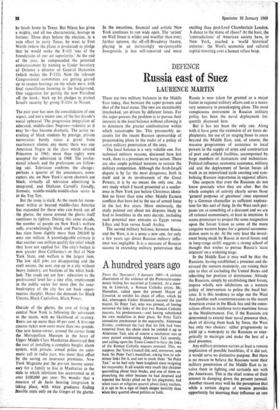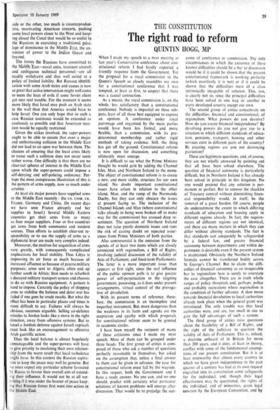Russia east of . Suez
DEFENCE LAURENCE MARTIN
There are two military balances in the Middle East today, that between the super-powers and that of the local states. The two are inextricably interlocked, yet driven by different forces. For the super-powers the problem is to pursue their interests in the local balance without allowing it to dominate the greater confrontation within which catastrophe lies. This presumably ac- counts for the recent Russian sponsorship of peacemaking plans in the midst of a policy of active military penetration of the area.
The local balance is a very volatile one. For technical military reasons, discussed here last week, there is a premium on hasty action. There are also ample political tensions to sustain the military competition. Although the Arab-Israeli dispute is by far the most dangerous, both in itself and in its involvement of the Great Powers, it is by no means the only one. An MIT study which I heard presented at a confer- ence in New York just before Christmas identi- fied no fewer than nine other Middle Eastern conflicts that have led to the use of armed force in the last five years. More ominously, the study pointed out about ten disputes likely to lead to hostilities in the next decade, including such potential new entrants as Egypt versus Libya and Iran versus Saudi Arabia.
The second military balance, between Russia and the West, is in a sense a new one, for only a few years ago direct Russian military influ- ence was negligible. It is a measure of Russian success in extending military penetration that Russia is now taken for granted as a major factor in regional military affairs and as a neces- sary accessory in peacekeeping plans. The most conspicuous instrument in Russian military policy has been the naval deployment fre7 quently discussed here.
But it has not been the only one. Along with, it have gone the extension of air force de- ployments, the use of air staging bases to areas beyond the Middle East, and, of course, the massive programmes of assistance to local powers in the supply of arms and construction of port and airfield facilities, accompanied by. large numbers of instructors and technicians. Political influence, economic assistance, military aid and the deployment of Soviet forces all work in an interrelated cycle creating and sym, bolising Russian importance in regional affairs.
One suspects that even the Russians do not know precisely what they are after. But the whole complex of activity clearly serves those `general purposes of greatness' once espoused by a German chancellor as sufficient explana- tion for this sort of thing. In the West such pur- poses are at something of a discount and we are all rational economisers, at least in intention. It seems premature to project the same resignation upon the Soviet Union as some of the more sanguine western hopes for a general accommo- dation seem to do. At -the very least the inveit- ment being made by Russia in naval forces and in long-range airlift suggests a strong school of thought that wishes to pursue Russia's `state interests' on a widening stage.
In the Middle East it may well be that the Russians, having established a presence and de- stroyed the western monopoly, are raising their aim to that of excluding the United States and inheriting her position of dominance. Ah-eady the Russians, simply by establishing their forces, impose wholly new inhibitions on a western policy of intervention to police the local bal- ance. It is this tendency to edge out. the West that justifies such countermeasures as the recent American cruise in the Black Sea and the osten- tatious efforts to reinforce NATO maritime forces in the Mediterranean. For, if the Russians are determined to-extend their naval presence then, short of driving them back by force, the West has only two choices: either progressively to yield up a monopoly to the Russians or ener- getically to maintiin and make the best of a dual presence.
Any military presence carries at least a remote implication of possible hostilities; if it did not, it would serve no distinctive purpose. But there is no reason to believe the Russians want their military penetration of the Middle East to in- volve volve them in fighting and certainly not with the Americans. This is the chief source of their interest in damping down the present turmoil. Another reason may well be the perception that while a certain degree of tension provides opportunity for inserting their influence on one
side or the other, too much is counterproduc- tive, reactivating American concern, pushing' some local powers closer to the West and keep= ing closed the Canal that would be so useful to the Russians in exercising a traditional privi- lege of dominance in the Middle F..?,st, the ex- tension of power to the Indian Ocean and beyond.
The forces the Russians have committed to the Middle Last—naval units, transient aircraft, and ambiguous technical personnel—are all readily withdrawn and thus well suited to a policy of limited liability. But Russian identifi- cation with some Arab'states and causes is now so great that active intervention might well come to seemthe least of evils if some Soviet client got into real trouble. For the moment it seems more likely that Israel may push an Arab state to the wall than that America would have to help Israel. One can only hope that in such a case Russian assistance would be extended as cautiously as possible and that American reac- tion would be equally restrained.
Given the stakes involved, the super-powers ought to be able to ensure that even a major and embarrassing collision in the Middle East did not lead to an open war between them. The chances of ensuring that the local crisis likely to 'cause such a collision does not occur seem rather worse. One difficulty is that there are no clear-cut spheres of interest in the Middle East upon which the super-powers could impose a self-denying and self-policing ordinance. Per- haps the most conspicuous illustration of this is the pattern of arms supply, now so much under scrutiny.
At least six major powers have supplied arms in the Middle East recently: the US, USSR, UK, France, Germany and China. (In recent days we have seen France abruptly end her supplies to Israel) Several Middle Eastern countries get their arms from as 'many as four major suppliers. Four or five countries get arms from both communist and western sources. Thus efforts to establish clear-cut re- sponsibility or to use the supply of_ arms as a diplomatic lever are made very complex indeed.
Moreover, the motives for acquisition of arms vary greatly, with consequently complicated implications for local stability. Thus Libya is improving its air force as much because of increased affluence as because of precise military purposes; arms sent to Algeria often end up farther south in Africa; Iran needs to refurbish a decayed military transport system and chooses to do so with Russian equipment. A pattern is hard to impose. Certainly the policy of shipping arms to stabilise the balance and deter_war has failed if one goes by crude results. But what the effect has been in particular places and times is more difficult to say. Failures will always be obvious, successes arguable. Selling air-defence missiles to Jordan looks like a move in the right direction, away from offensive systems. But to Israel a Jordani defence against Israeli reprisals must look like an encouragement to offensive Arab guerrilla action.
Thus the local balance is almost hopelessly unmanageable and the super-powers will have to give priority to insulating their own relation- ship from the worst result that local turbulence might have. In this context the Russian aspira- tion to keep the peace may well be genuine. But we must expect any particular scheme favoured by Russia to favour their overall aim of extend- ing their influence. It would not be at all sur- prising if it was under the banner of peace keep- ing that Russian forces first went into action in the Middle East.



































 Previous page
Previous page